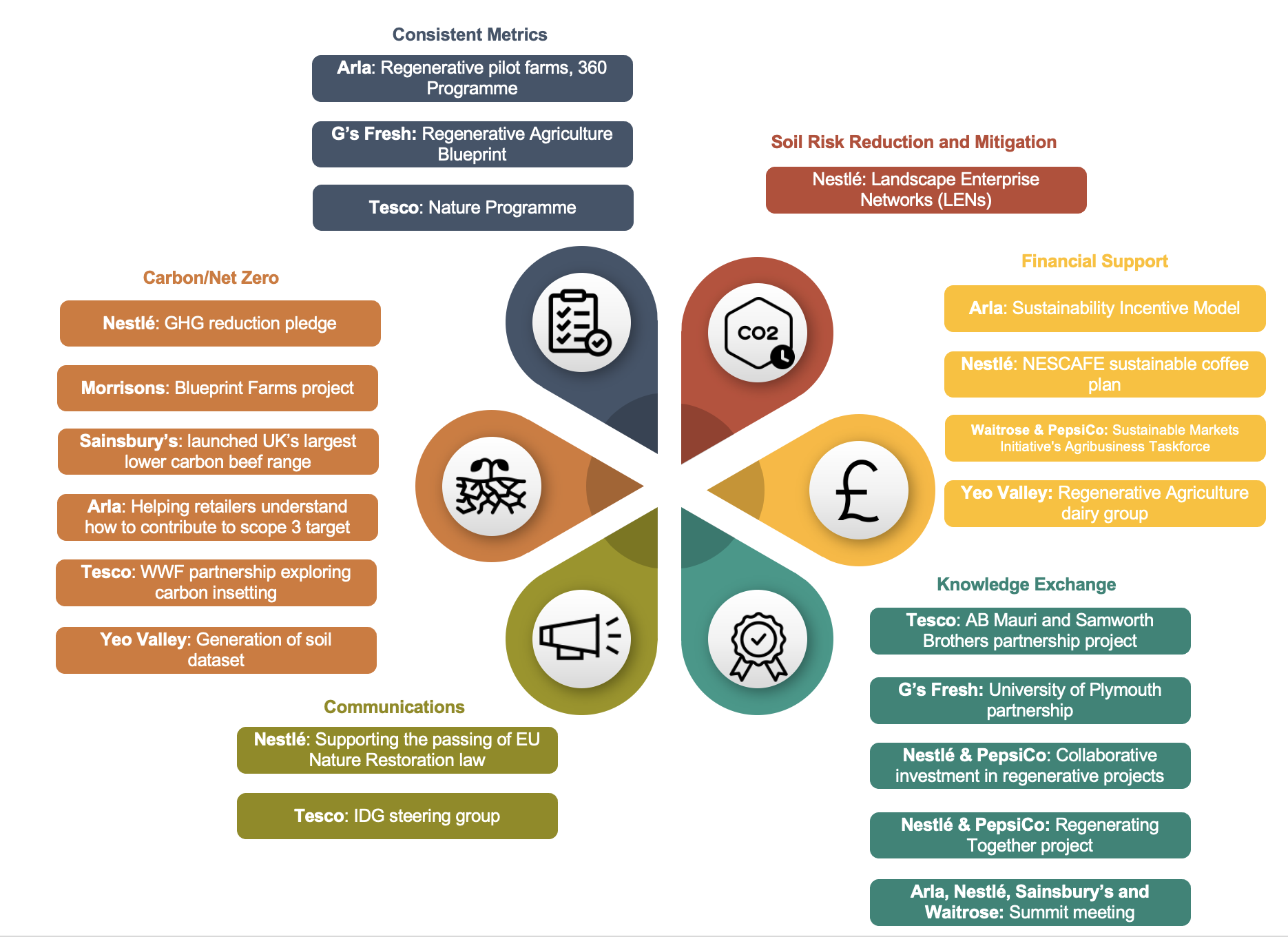Soil Health Industry Platform 2023
Soil-Related Business Initiatives in 2023
March 2024
The Sustainable Soils Alliance (SSA) has been tracking the food industry’s progress in regards to regenerative agriculture and soil health initiatives via its Soil Health Industry Platform (SHIP). The 2023 SHIP report highlights our key Observations, soil-related Business Initiatives and based on our analysis we’ve recommended six Priority Actions to take forward in 2024.
The following are key soil-related initiatives undertaken by the SHIP businesses in 2023 based on the Platfrom's six priority action areas.

1) Consistent Metrics
Arla: Continues work with FAI on six regenerative pilot farms. Soil health is being measured to inform their regenerative transition and their Sustainable Incentive Model. Arla’s 360 Programme also pays for soil sampling (no specific metrics are required other than Soil Organic Matter).
G’s Fresh: Continues developing their Regenerative Agriculture Blueprint for all supplying farms. The aim is for them to have started transitioning by 2030, and will in time include soil health metrics.
Tesco: Following the end of their partnership with WWF, Tesco have published their Nature Program which will seek to address soil health in due course.
2) Soil Risk Reduction and Mitigation
Nestlé: Continues working on their collaborative Landscape Enterprise Networks (LENs) model, which allows different industries and businesses to understand and invest in ways to reverse nature degradation and support farmers in doing so.
3) Communications
Nestlé: Part of over 100 businesses urging the EU to pass the Nature Restoration law, emphasising the need for ambitious environmental policies.
Tesco: Part of IDG steering group developing consumer facing eco-labels.
4) Knowledge Exchange
Tesco: Partnered with fava bean processor AB Mauri and Samworth Brothers to launch new trials seeking to increase its production. Main benefits cited are the crop ability to promote healthy soils, cut emissions by locking in soil carbon and replacing some of the soy used in animal feed.
G’s Fresh: Collaborating with the University of Plymouth on a PhD studentship seeking to explore the trade-offs linked to peatland management and sustainable food production.
Nestlé and Cargill, and PepsiCo and Walmart: Announced new collaborations and investments towards various regenerative agriculture projects.
Nestlé and PepsiCo: Amongst some of the F&D businesses who are part of the Regenerating Together project rolled out by the Sustainable Agriculture Initiative (SAI) Platform. Members have signed up to a new framework agreement for the transition to regenerative agriculture.
Arla, Nestlé, Sainsbury’s and Waitrose: Amongst industry leaders who met at the Regenerative Farming and Food System Summit in Amsterdam to discuss ways to unify the food industry to accelerate regenerative agriculture practices through partnership and harmonisation.
5) Financial support
Arla: Announced that the first incentive payments part of its Sustainability Incentive Model took place in August 2023. Farmers will be paid more per kilogram of milk when taking action to reduce emissions across their value chain.
Nestlé: NESCAFE plan is aiming to improve soil health and is supporting farmers to do so in order to provide sustainable coffee. Practices supported under the plan include composting, intercropping where two or more crops are grown alongside each other, and cover crops.
Waitrose and Pepsico: Part of the Sustainable Markets Initiative's Agribusiness Task Force, who have launched a blended finance framework to make regenerative farming financially viable. The framework will be explored in the UK, India and the US.
Yeo Valley: Working with First Milk to recruit a regenerative agriculture dairy group. These farmers will receive support for certain practices – largely based around 5 regenerative agriculture principals.
6) Carbon/Net Zero
Nestlé: Their joint venture with General Mills, Cereal Partners Worldwide (CPW), has pledged to halve its greenhouse gas emissions by 2030 and reach net zero by 2050. Part of this will include moving towards regenerative agriculture.
Morrisons: Teamed up with Downforce Technologies to analyse soil health and calculate emissions on five pilot farms, forming their "Blueprint Farms”. The collaboration aims to optimise sustainable farming practices and help Morrisons become the first UK supermarket directly supplied by net-zero carbon British farms by 2030.
Sainsbury’s: Launched the UK’s largest lower carbon beef range, claiming to cut 25% off benchmark beef industry carbon footprint.
Arla: Working more closely with retailers to understand how they can directly invest in activities on farms to contribute to scope 3 target.
Tesco: WWF-Tesco partnership exploring the governance and frameworks around carbon insetting.
Yeo Valley: Have finished collecting soil carbon data from 18 thousand acres and now have a soil dataset on their organic systems. They will now need a second data point to go beyond baselining, which will be carried out starting in 2025. They also launched a partnership with First Milk to establish a new conventional regenerative milk pool in the Southwest of England.
The Platform has been running for two years to foster collaboration and cooperation in the field of soil health among major UK food and drink businesses. It consists of 11 members: Arla, G’s Fresh, Kellogg’s, Morrisons, Nestlé, Nomad Foods, PepsiCo, Sainsbury's, Tesco, Waitrose, Yeo Valley. If you are interested in joining the Platform or would like to learn more about it, please get in touch: